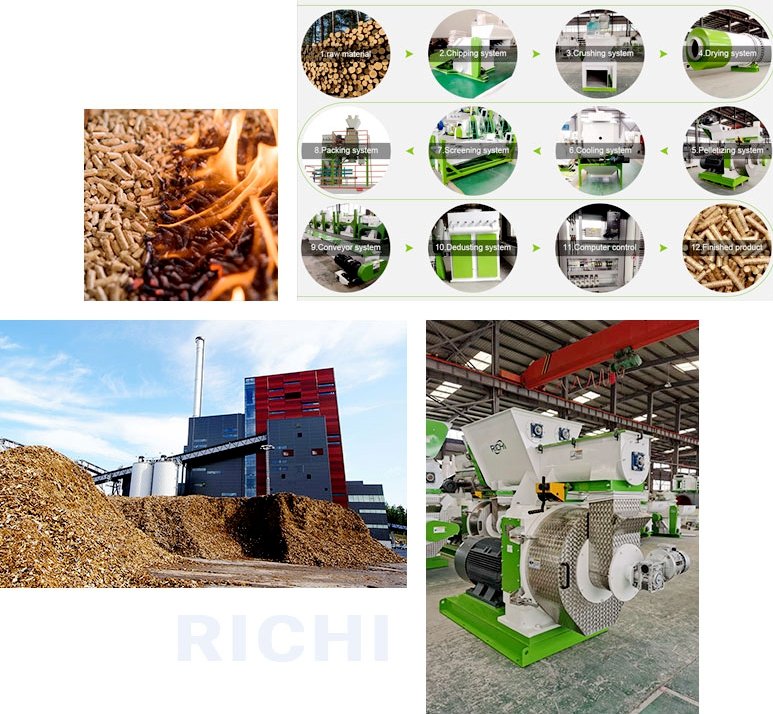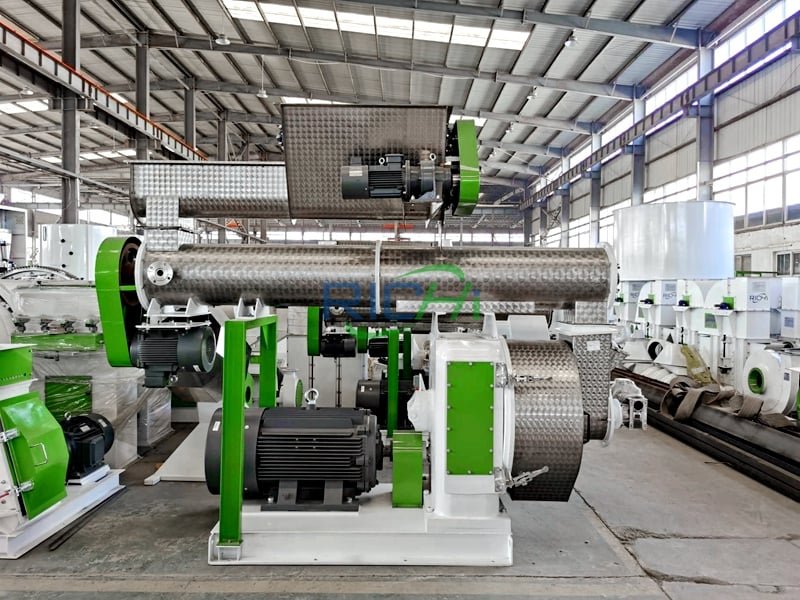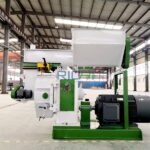Introduction to Biomass Pellet Machine for Sale
A “biomass pellet machine for sale” refers to the commercial availability of machinery designed to convert various forms of biomass into pellets. These machines play a critical role in the production of biomass pellets, which are an eco-friendly and renewable energy source. Biomass pellets are primarily made from organic materials such as wood, agricultural residues, and other biomass, providing a sustainable alternative to fossil fuels.
Uses of Biomass Pellet Machines
Biomass pellet machines are primarily used for the following purposes:
Residential Heating: Biomass pellets are widely used in pellet stoves and boilers for home heating, offering a sustainable and cost-effective alternative to traditional heating fuels like oil or natural gas.
Industrial Power Generation: Many industries use biomass pellets to co-fire with coal or in dedicated biomass power plants, contributing to significant reductions in carbon emissions.
Commercial Heating: Commercial entities such as schools, hospitals, and businesses use biomass pellets for heating, thanks to their efficiency and lower environmental impact.
Agricultural Uses: In agriculture, biomass pellets can be used as organic fertilizers or animal bedding, providing a natural and eco-friendly option.
Industry Analysis and Data
The global biomass pellet market is experiencing significant growth due to rising demand for renewable energy sources. In 2022, the global biomass pellet market was valued at approximately USD 10 billion, with projections suggesting a growth rate of 12.5% CAGR, reaching around USD 18 billion by 2027. Europe dominates the biomass pellet market, with over 60% of global production, driven by stringent environmental regulations and the transition to renewable energy sources.
In the industrial sector, biomass pellets are increasingly being used as an alternative to coal, particularly in Europe and North America. The growing demand for sustainable energy has led to increased investment in biomass pellet production facilities, further boosting the market for biomass pellet machines.
Classification of Biomass Pellet Machines
Biomass pellet machines can be classified based on their design, function, and the type of biomass they process:
Flat Die Pellet Machines: These machines are typically used for small-scale pellet production. They are compact, easy to operate, and are commonly used in households and small businesses.
Ring Die Pellet Machines: Suitable for large-scale production, ring die pellet machines are designed for high efficiency and continuous operation. They are widely used in commercial and industrial applications.
Horizontal Pellet Mills: These machines are used for processing various types of biomass and are known for their high output and durability.
Vertical Pellet Mills: Vertical pellet mills are often used for processing feedstock with a high moisture content, such as straw and grass.
Working Principle and Process Flow

The working principle of a biomass pellet machine involves the compression of biomass materials into pellets through a series of processes: https://www.richimanufacture.com/biomass-pellet-production-line/
Material Preparation: Raw materials like wood chips, sawdust, or agricultural residues are first collected and processed to reduce their size and moisture content.
Grinding: The raw materials are then ground into fine particles using a hammer mill or crusher, ensuring uniformity in size.
Pelletizing: The ground biomass is fed into the pellet machine, where it is compressed under high pressure and temperature. The material is forced through a die, forming cylindrical pellets.
Cooling: After pelletizing, the hot pellets are cooled using a cooler, which reduces their temperature and moisture content, ensuring durability.
Screening: The cooled pellets are screened to remove any fines or dust, resulting in a uniform product.
Packaging: The finished pellets are then packaged using a packaging machine, ready for transport and sale.
Choosing a Biomass Pellet Machine: Case Studies and Considerations
When choosing a biomass pellet machine, it is essential to consider several factors to ensure optimal performance and return on investment. Below are some critical considerations:
Production Capacity: Determine your production needs. For example, a small farm might need a flat die pellet machine, while an industrial plant may require a ring die machine with a higher capacity.
Raw Material: The type of biomass material you plan to process will influence your choice of machine. For instance, if you are processing hardwood, a ring die pellet machine may be more suitable due to its durability and efficiency.
Energy Efficiency: Opt for energy-efficient machines to reduce operational costs. High-efficiency machines may have a higher upfront cost but can save money in the long term.
Automation Level: Depending on the scale of production, consider the level of automation you require. Automated systems can increase efficiency and reduce labor costs.
How to Choose a Supplier
Selecting the right supplier is crucial for ensuring the quality and reliability of your biomass pellet machine. Here are some key factors to consider:
Customization Capabilities: Choose a supplier that can customize the pellet production line to meet your specific needs. This includes designing the production line according to your site layout and operational requirements.
Experience and Reputation: Look for a supplier with a proven track record in the industry. Experience in manufacturing and after-sales support is vital.
After-Sales Support: Ensure that the supplier offers comprehensive after-sales services, including technical support, spare parts availability, and maintenance services.
Turnkey Solutions: Some suppliers offer turnkey solutions, handling everything from design and installation to commissioning and training. This can be beneficial if you require a hassle-free setup.
Introducing Richi Machinery Company
Richi Machinery Company is a leading manufacturer of biomass pellet machines and the largest pellet production line manufacturer in Henan, China. Richi Machinery specializes in providing customized pellet production lines tailored to each customer’s needs, ensuring optimal performance and efficiency.
Key Offerings of Richi Machinery:
Customized Production Lines: Richi Machinery designs pellet production lines according to the customer’s site layout, ensuring that the system is tailored to the specific requirements of the project.
Turnkey Project Expertise: Richi Machinery provides comprehensive turnkey solutions, handling every aspect of the project, from initial design to final commissioning.
Advanced Technology: The company uses state-of-the-art technology in its machinery, ensuring high efficiency, durability, and ease of operation.
Strong After-Sales Support: Known for its reliable after-sales service, Richi Machinery offers ongoing support to ensure the longevity and performance of its equipment.
Practical Application Value of Biomass Pellet Machines
The practical application value of biomass pellet machines lies in their ability to convert low-value biomass into high-value pellets, contributing to energy sustainability and environmental conservation. Biomass pellets offer a renewable, low-emission alternative to fossil fuels, making them a vital component in the transition to a greener energy future.
In industrial applications, biomass pellets provide a cost-effective and cleaner alternative to coal, helping to reduce greenhouse gas emissions. In residential and commercial heating, biomass pellets offer an efficient and environmentally friendly solution, with the added benefit of utilizing waste materials that would otherwise go to landfill.
FAQs About Biomass Pellet Machine for Sale
Q1: What types of biomass can be processed with a biomass pellet machine? A1: Biomass pellet machines can process various types of biomass, including wood, agricultural residues (such as straw, husks, and stalks), grass, and other organic materials.
Q2: How much does a biomass pellet machine cost? A2: The cost of a biomass pellet machine varies depending on its type, capacity, and level of automation. Prices can range from a few thousand dollars for small-scale machines to over $100,000 for large industrial machines.
Q3: What is the typical production capacity of a biomass pellet machine? A3: Production capacity varies widely, from 100 kg/h for small-scale machines to over 5 tons per hour for industrial machines.
Q4: How long does it take to set up a biomass pellet production line? A4: The setup time can vary depending on the complexity of the production line and the supplier’s capabilities. A turnkey project might take several weeks to a few months from design to commissioning.
Q5: What are the key maintenance requirements for a biomass pellet machine? A5: Regular maintenance includes checking and replacing wear parts (such as dies and rollers), lubricating moving parts, and ensuring that the machine is clean and free of dust and debris.
Conclusion
Biomass pellet machines play a vital role in the growing bioenergy industry, providing a sustainable and efficient solution for producing renewable energy. By choosing the right machine and supplier, businesses can optimize their production processes, reduce costs, and contribute to a greener future. Richi Machinery Company stands out as a leader in this field, offering customized, turnkey solutions that meet the diverse needs of the global market.


